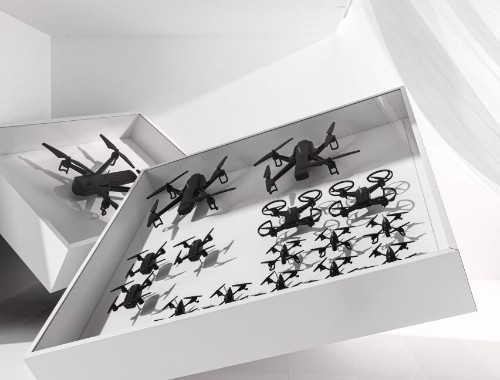
An artist's impression of IKEA Gwangmyeong store that will be built later this year.
IKEA Group, which is about to enter the Korean market, will be an emerging threat to domestic furniture firms because of its competitive pricing, analysts and industry people said Wednesday.
European furniture firms like IKEA export their products to Korea without paying tariffs, and this will put the Swedish furniture retailer in a better position in terms of prices here, the Korea Furniture Association (KOFA) said in a statement.
"Korean furniture companies pay 8 percent tariffs on imported materials such as particle boards and hinges needed to make furniture products," KOFA Director Lee Yong-won said by telephone.
As a way to survive, Lee urged domestic players to join forces in efforts to lower the import tariffs on the import materials, among other things. He expected some Korean furniture firms will be doomed to perish in the years ahead.
In a step forward, KOFA plans to ask IKEA Korea to sell some of products manufactured by domestic companies at its outlets. More than 50 percent of products now being sold at IKEA's outlets in China are from Chinese companies, he explained.
Imported furniture products accounted for 16 percent of Korea's furniture market in 2007, up from 9.7 percent in 2005, according to Statistics Korea. During the same period, furniture-related trade deficits deepened to $765 million from $402 million, data from the Korea Customs Service showed.
Korea increasingly imports furniture products from China as Korean manufacturers have moved their plants to Asia's fastest growing economy due largely to lower labor costs, KOFA said.
At this critical juncture, Lee said, "Korean firms should read rapidly changing consumer appetites and develop their own products and designs."
IKEA will offer "affordable" furniture products to become a force in Korea's 5 trillion won ($4.8 billion) furniture market, IKEA Korea said Wednesday.
Taking aim at customers sensitive to prices and quality, the Swedish company will open its first outlet in Korea later this year. It plans to increase the number of outlets here to five by 2020, according to IKEA Korea.
In Korea, where big-name furniture companies such as Hanssem and Hyundai Livart control the market, IKEA said it will woo customers by mainly providing do-it-yourself furniture products at reasonable prices.
"We have been carefully preparing to advance into Korea and now we are ready to meet consumers in Korea at the IKEA Gwangmyeong store at the end of this year," Ulf Smedberg, country marketing manager at IKEA Korea, told The Korea Times in a recent interview.
But he did not specify what market share the company is targeting in Korea by 2020.
For IKEA, Korea is an important market and is one of the most influential Asian markets. The IKEA Gwangmyeong outlet will be one of the world's largest, and Asia's largest IKEA store, Smedberg said.
To be sure, the Korean furniture market has suffered declining demand since the 2008 financial crisis hit the construction sector. Furniture suppliers still find the demand running low due to a prolonged economic slowdown.
Given this, IKEA believes that Korean consumers will like the experience of assembling furniture products on their own, and they will welcome the reasonable prices of its products.
As IKEA has done with other markets, the global home furnishing firm conducted "rigorous research about the life at home in Korea to understand how the people live at home," Smedberg said. "We have done many home visits and various market researches to understand the Koreans' preference, habits, tastes etc. and will continue to do this to get a deeper understanding."
Through the research, IKEA said it has found some unique Korean life at home activities.
Based on the findings, the Almhult-based company said it had learned that "Korean consumers seek more storage and organizing solutions and want to create warmth and coziness at home."
IKEA found Korean consumers put children's safety as the top priority, and they want to know how to organize children's things efficiently at home.
Thus, "we will share our home furnishing knowledge with Korean consumers, and inspire them with our affordable and relevant solutions" under the vision to create a better everyday life for people, he said.



























 沪公网安备31010402003309号
沪公网安备31010402003309号